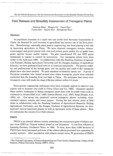Field Release and Biosafety Assessment of Transgenic Plants
JIRCAS international symposium series
| ISSN | 13406108 |
|---|---|
| 書誌レコードID(総合目録DB) | AA1100908X |

本文フルテキスト
intlsymp-5_279-286.pdf191.31 KB
As population increases at a rapid rate and arable land decreases dramatically in China, the demand for yield increase in agriculture has become one of the first priorities. Biotechnology, especially plant genetic engineering, has been playing a key role in improving agriculture in China. We have obtained transgenic tomato, tobacco, sweet pepper and potato plants with viral coat protein genes and/or B.t. or spider toxic genes against viruses and/or insects. We also transformed PG and EFE genes (antisense) in tomato to control its maturation. Our transgenic plants have been tested in the field since 1989. In collaboration with the Dandong Academy of Agriculture Sciences, Beijing Agriculture University and the Jiangsu Academy of Agriculture Sciences, we have performed field tests at 11 locations nationwide. The genetic stability and performance of the foreign gene, and the quality and yield of the transgenic plants have also been studied. We paid attention to biosafety issues, too. A group of European scientists who visited several sites where transgenic plants were released concluded that the biosafety level was high in China. We anticipate that many more transgenic crops will reach the stage of farmer release within 3-5 years.
Plant genetic engineering techniques have been routinely applied to improve crop quality and to increase crop yield in China (Chen and Gu, 1993). Scientists applied these modern techniques to obtain transgenic plant lines with favorable traits such as resistance to viruses (Abel et al., 1986), insects (Barton et al., 1987), fungi (Broglie et al.,1991), etc. Our group has produced various transgenic plants, including virus-resistant tobacco, tomato and sweet pepper. During the last several years of field trials in collaboration with the Dandong Academy of Agricultural Research, Beijing Agricultural University, and the Jiangsu Academy of Agricultural Sciences, we have analyzed various important genetic as well as agronomic traits of those plants. Here we summarize the results of our field releases.
Plant genetic engineering techniques have been routinely applied to improve crop quality and to increase crop yield in China (Chen and Gu, 1993). Scientists applied these modern techniques to obtain transgenic plant lines with favorable traits such as resistance to viruses (Abel et al., 1986), insects (Barton et al., 1987), fungi (Broglie et al.,1991), etc. Our group has produced various transgenic plants, including virus-resistant tobacco, tomato and sweet pepper. During the last several years of field trials in collaboration with the Dandong Academy of Agricultural Research, Beijing Agricultural University, and the Jiangsu Academy of Agricultural Sciences, we have analyzed various important genetic as well as agronomic traits of those plants. Here we summarize the results of our field releases.
| 作成者 | Xiaotian Ming Hongya Gu Naisui Pan Yuxian Zhu Baojun Sun Zhangliang Chen |
|---|---|
| 公開者 | Japan International Research Center for Agricultural Sciences |
| オンライン掲載日 | |
| 号 | 5 |
| 開始ページ | 279 |
| 終了ページ | 286 |
| 言語 | eng |
